Whether you’re adding an ecommerce store to an existing retail business or starting from scratch, the platform you choose can impact everything from efficiency and effectiveness to security and growth potential. Simply put, it’s the foundation of your entire online presence.
One of the considerations you want to make when choosing an ecommerce tool is whether or not it’s open source. Open source means that the code is easily available for anyone to view, edit, and build upon.
There are a wealth of benefits that come alongside choosing an open source ecommerce platform instead of the proprietary or closed source alternatives. Let’s explore those, and see why using open source ecommerce solutions is the way to unlock the full potential of your online store.
What is open source ecommerce?
Open source software makes its source code publicly accessible to read, modify, and work on. In contrast, proprietary or closed source software locks the code down, only allowing the original developers to legally edit it and make changes.
Open source licenses
How do open source licenses work? They differ dramatically from their closed source counterparts. Typically, they allow people to use the software in any manner they see fit. WordPress, for example, falls under the General Public License, which outlines four freedoms:
- The freedom to run the program for any purpose.
- The freedom to study how the program works and change it to make it do what you wish.
- The freedom to redistribute.
- The freedom to distribute copies of your modified versions to others.
Open source community
But the idea of open source goes beyond just licenses and code availability. There’s a general attitude of community and collaboration that typically comes with this type of software. Because the code is available for anyone to edit, web developers can contribute to the project as a whole and improve it in a variety of ways.
Open source in the ecommerce space
Open source ecommerce software, of course, is a set of tools that follow these principles, with features specifically for online stores. WooCommerce is one example of an open source ecommerce solution, offering everything merchants need to run an online store.
Proprietary vs open source ecommerce platforms
Now that we’ve established the idea behind open source, let’s see how it differs from closed source (or “proprietary”) alternatives.
|
Open Source |
Closed Source | |
|
Source code availability |
Available to the general public |
Not available to the public |
|
Ability to modify code |
Anyone can modify the source code and contribute to the software |
All modifications are made by the software developers themselves |
|
Support |
Often provided by the community of users |
Typically provided by the software’s team members |
|
Cost |
Often free or available at a much lower cost |
Typically only available at at a premium price |
|
Transparency |
Full transparency, since the code is visible to all |
Limited transparency, since the average user cannot view the source code |
|
Innovation |
Limitless, since so many developers are contributing |
Limited based on the software’s team size, budget, etc. |
As you can imagine, these differences can really impact the experience for the store owner and their audience.
The benefits of open source ecommerce
There are a lot of benefits that come with choosing an open source ecommerce tool. Let’s take a closer look at just a few.
Control and ownership
When you run an online store, you want to have full control over everything from the design of your ecommerce site to the content you publish. This is where open source shines.
If you use a proprietary ecommerce platform, like Shopify or Wix, you’re beholden to the terms of their licenses, which are much more stringent than with open source. If you accidentally break any of their terms of service, they can take down your shop with no notice.
This means that you could suddenly lose all of the hard work you’ve put into your online store, suffer a damaged reputation, and miss out on sales while you try to get back up and running.
In contrast, when you choose an open source ecommerce tool like WooCommerce, you can use it for anything you’d like. You install the software on the hosting provider or server of your choosing, and you have full control over it. The software developers can’t take down your store for any reason.
With open source, you also have more control over backups and migrations. You can back up both your site content and the software itself using the method you prefer — manually, host-provided, or with a plugin. Store them in the cloud or on your own device. And if you ever want to switch to a new hosting provider, use them to move wherever you’d like.
This isn’t the case with closed source ecommerce platforms. While some do offer backup tools, they typically just save your content rather than the software, leaving you with incomplete copies of your site.
Migrating to another platform is difficult at best. Since the proprietary tool owns the software and code, you can’t simply move it elsewhere. So while you can migrate some of your content — though that can be difficult in many cases, too — you can’t move your entire online store.
Cost
Pricing is often a big consideration for small businesses, especially when they’re just starting out. Many proprietary platforms charge monthly or yearly fees, and some even take a percentage of each sale that you make. Those costs can increase as you grow, earn more sales, and need additional functionality.
That means less money in your bank account as you’re starting out and as you scale.
But most open source ecommerce tools, like WooCommerce, are completely free. Those that aren’t are typically available at a much lower price than proprietary options.
Frequent updates
There are constantly a lot of web developers working on, modifying, and improving the code of open source ecommerce software. They have a variety of backgrounds and experience levels. And, instead of working for the proprietary company, they’re often striving to better the software or create a specific solution for themselves or their clients.
This means that there’s a lot of ingenuity, a lot of innovation, and a lot of passion put into the ongoing development of open source tools.

This simply isn’t the same as the development team working on proprietary software. Due to the nature of closed-source tools, they’re limited based on team size and experience, budget, and other similar constraints.
And because there are so many people working on open source software, they are likely to find bugs and security vulnerabilities faster. This can help make the software more secure and relevant.
Scalability
With fewer limitations, open source ecommerce tools allow for much greater scalability and can readily support anything from a small startup to an enterprise business. As your store grows, you won’t have to worry about hidden fees or costs based on the number of visitors, customers, products, or variations you have.
As you make more sales and offer more products, you’ll likely need additional functionality as well. With open source ecommerce tools, there are typically many more extensions and add-ons to choose from. And if you can’t find anything to meet your business needs, the editable source code makes it possible for a web developer to create a solution just for you.
Finally, especially in the case of WooCommerce, you have the freedom to move to any hosting provider that you’d like. This allows you to upgrade server software and resources based on your traffic and functionality requirements, which isn’t the case with proprietary options. Overall, you have the opportunity to create a more scalable online store.
Flexibility, customization, and integrations
We’ve touched on this a bit throughout some of the other benefits listed. However, this is an area in which open source really shines. The ability to edit and modify source code for any purpose opens up a wealth of possibilities. You can create virtually anything you’d like. Or, of course, you could hire an expert to do so on your behalf or even for multiple stores that may need a shared solution.
This also enables you to create custom integrations with any tool that you use. In many cases, ecommerce stores need to sync with other sales channels, social media platforms, SEO tools, inventory management systems, specialty payment gateways, email marketing tools, and more.
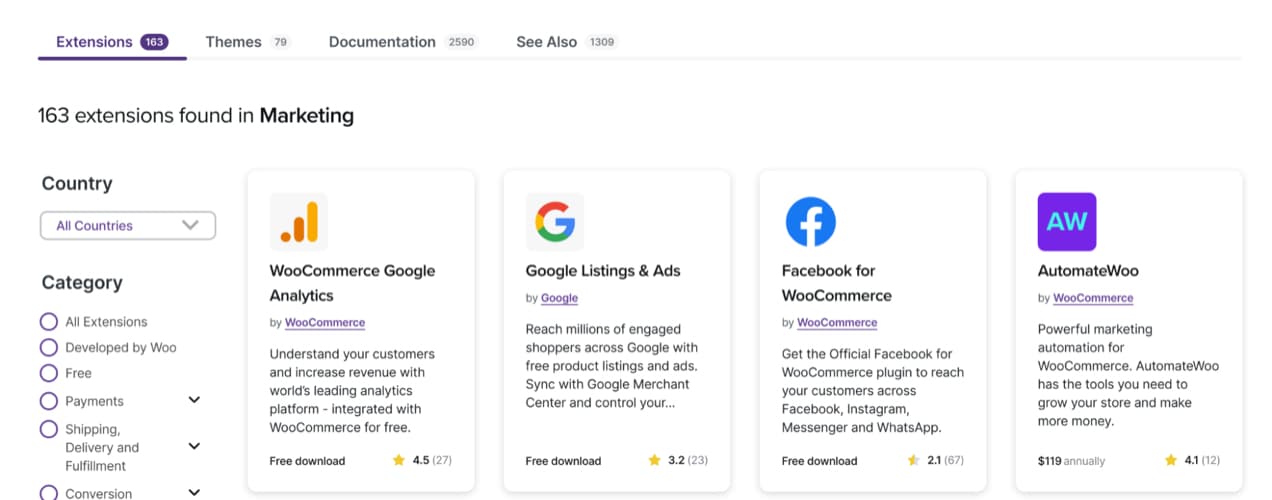
Again, there are often many more add-ons and third party integrations available with open source software due to the number of developers contributing. And if there isn’t something that meets your needs, simply create your own solution or work with someone who can.
Widespread community support
The community behind open source software, especially the WordPress content management system and WooCommerce, is like no other. There’s an incredible sense of camaraderie and giving back to the project as a whole. It’s about the collective experience, driven by imagination and innovation.
As the WordPress.org website states, “Supporting the idea of democratizing publishing and the freedoms that come with open source, is a large community of people collaborating on and contributing to this project.”
In 2022, 988 people contributed to WordPress core development alone. And these contributions came from countries all over the world, including the United States, France, Bangladesh, India, and Italy.
And at each annual WordCamp U.S., there’s a Contributor Day, where members of the community can give back to WordPress core development. Activities range from fixing bugs and testing software to writing code and documentation — but it’s all designed to better the open source content management system (CMS) for all users.

Support for open source software is typically community-driven. For example, WooCommerce and WordPress provide free support forums that allow anyone to contribute with helpful guidance and advice. This opens the door to unique, creative solutions from people who have experienced similar problems on their own store.
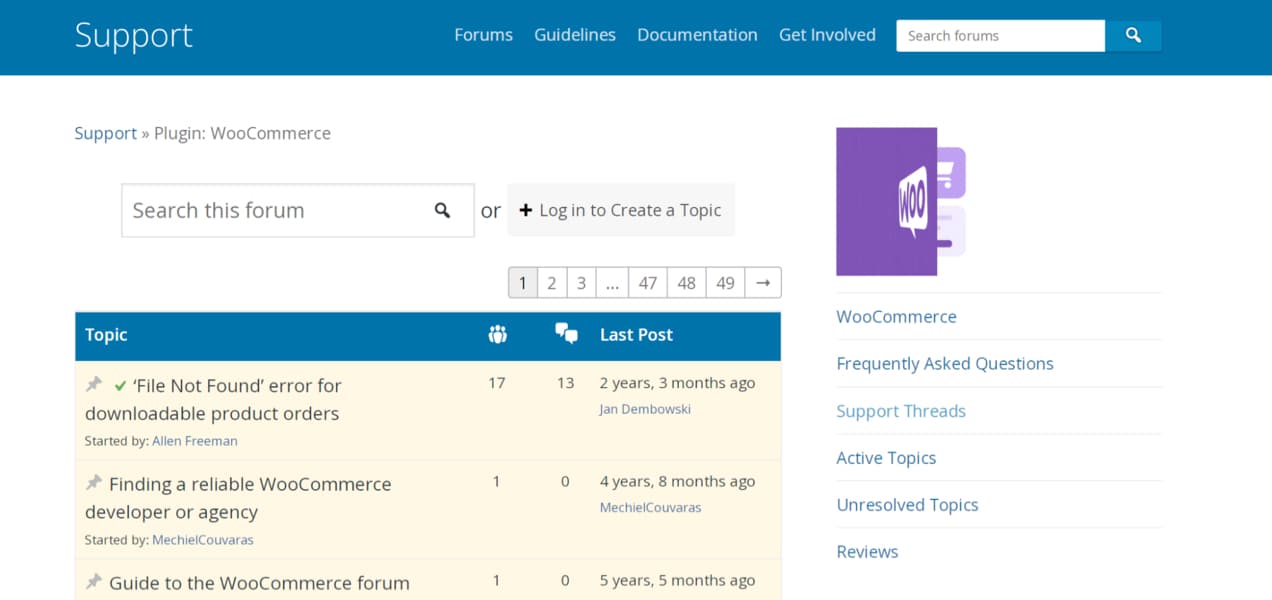
No vendor lock-in
When you’re using a closed source ecommerce tool, it can be quite difficult to leave. To start, you may be locked into an agreement for a certain amount of time. Or perhaps you even paid for a year or more in advance.
Then, there’s the fact that the software is proprietary. That means that not only will it not work on another platform, you simply won’t be able to access it and move it elsewhere. You also typically don’t have access to full ecommerce website backups or, if you do, they’ll only work on that specific platform.
How does this manifest itself for ecommerce store owners? If you ever outgrow the platform you’re using or simply want to move for any other reason, you’ll lose a lot of your hard work.
While you can usually migrate information like product and customer data and sales history, you can’t move the actual design of your site. The migration process can also be tricky, especially without a third-party tool or web developer at your side.
Take a look at how migrations work for Shopify and Wix.
Ease of use
Proprietary software is typically marketed as easy to use, but it’s important to understand that this can also be true for open source tools.
For example, WooCommerce users can take advantage of the powerful built-in block editor. Design pages, checkout experiences, blog posts, headers, footers, and more by dragging and dropping elements — like images, videos, columns, paragraphs, and headings — into place. This allows absolutely anyone, regardless of their development or design experience, to build a beautiful, functional ecommerce store.
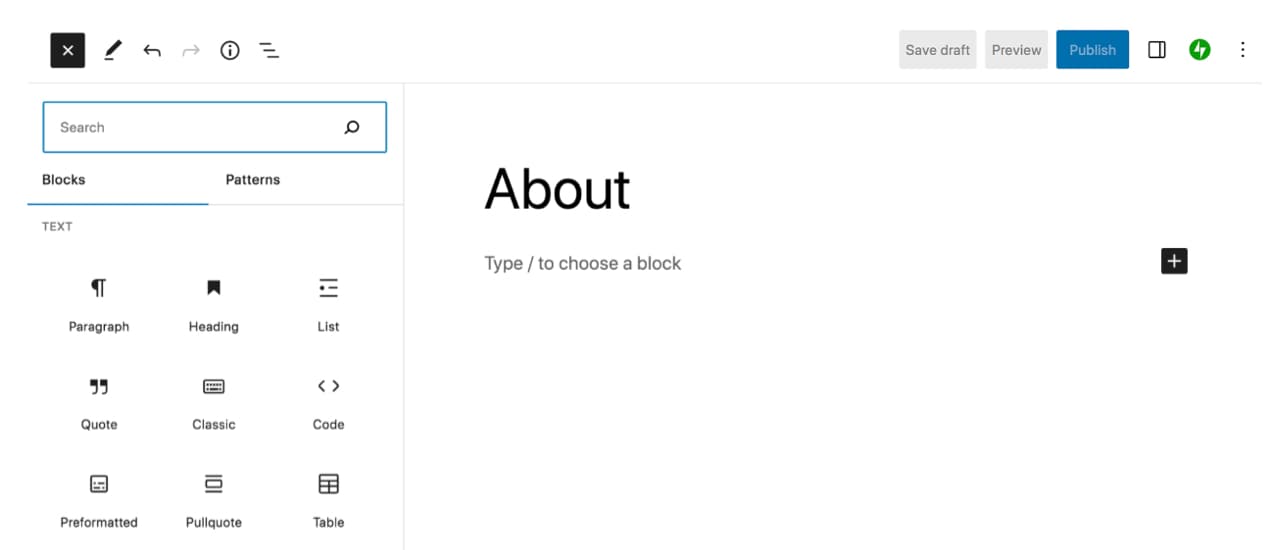
Open source software also typically has extensive documentation available, along with a huge volume of community support. All of this combined with the flexibility of open source makes for a robust store building experience.
The drawbacks of open source ecommerce software
Of course, not every type of software is right for every single situation and business. And open source ecommerce software is no exception. Now that we’ve looked at the benefits, let’s examine some of the downsides as well.
More management tasks in the merchant’s hands
With open source software, routine maintenance and decisions are in the hands of the store owner. This includes things like updates, maintenance, backups, and security practices.
This, of course, is a trade-off for more control. You can handle these tasks however you see fit and ensure that they’re being done to the highest quality. But some may prefer to be completely hands off, as you can with proprietary software.
With WordPress, however, you can automate many of these tasks. Turn on auto-updates, set up real-time backups, add a security plugin — it’s the best of both worlds.

Less hands-on support
We discussed how, with WooCommerce, support is available from community members and developers through open forums. There are, however, no dedicated support options for the core software.
But there is a wealth of documentation available, along with tutorial videos, meetups, Facebook groups, and more. And all premium WooCommerce extensions do include dedicated support.
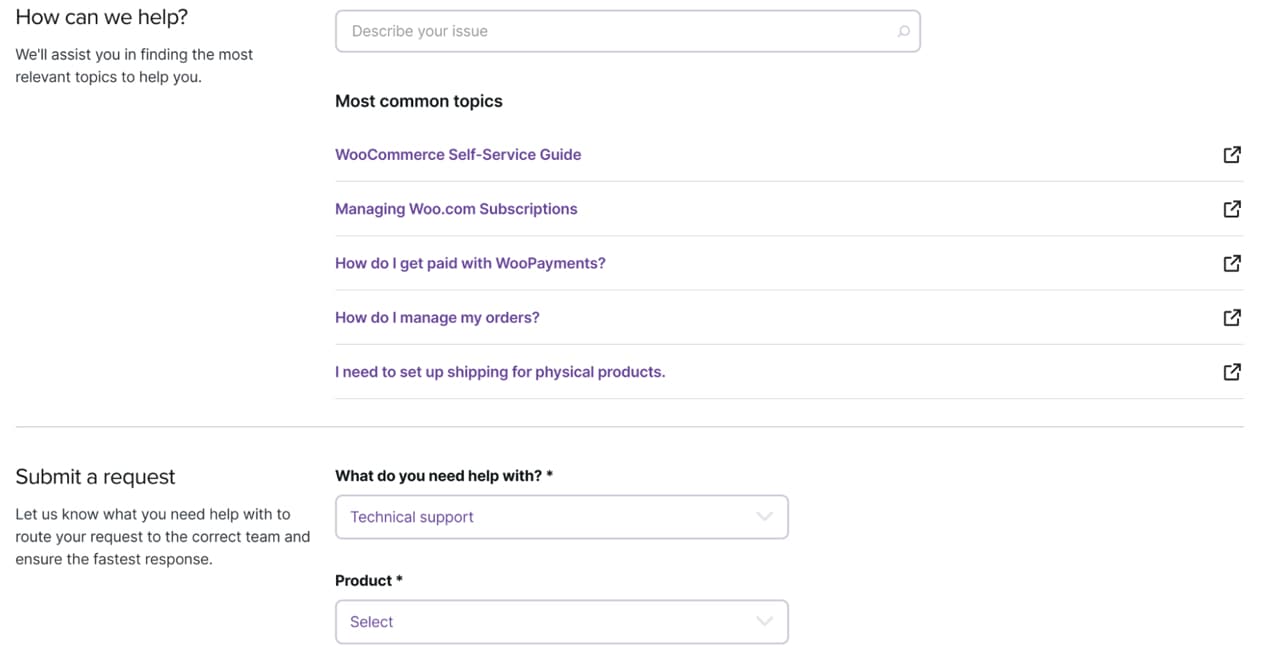
You may also receive more dedicated support from specific hosts and software providers you’ve purchased services from, though these can be limited to the specific features they provide.
More decisions to get started
Proprietary systems typically include ecommerce functionality alongside hosting, dedicated support, backup tools, security practices, and more. It’s all packaged together.
With open source ecommerce software, you’re responsible for choosing these “extras.” You can pick your own cloud hosting or standard hosting provider, install a backup plugin or manually take your own, choose your own inventory control systems, work with multiple p payment gateways, set up security tools however you see fit, etc. It’s all in your hands.
Again, this gives you ultimate control to choose the right solution for your specific situation, but isn’t right for every single business.
Variable plugin quality standards
One of the benefits of open source is the wide array of add-ons and plugins that developers have created using the source code. Many of these are available for free.
However, they come from a variety of sources and developers, not all of which are high quality. There are even nulled versions of premium plugins and themes that can introduce security vulnerabilities into your site.
The simple solution to this is to vet your sources. For example, everything in the WordPress.org theme and plugin repository has been verified, along with all of the extensions in the WooCommerce marketplace.
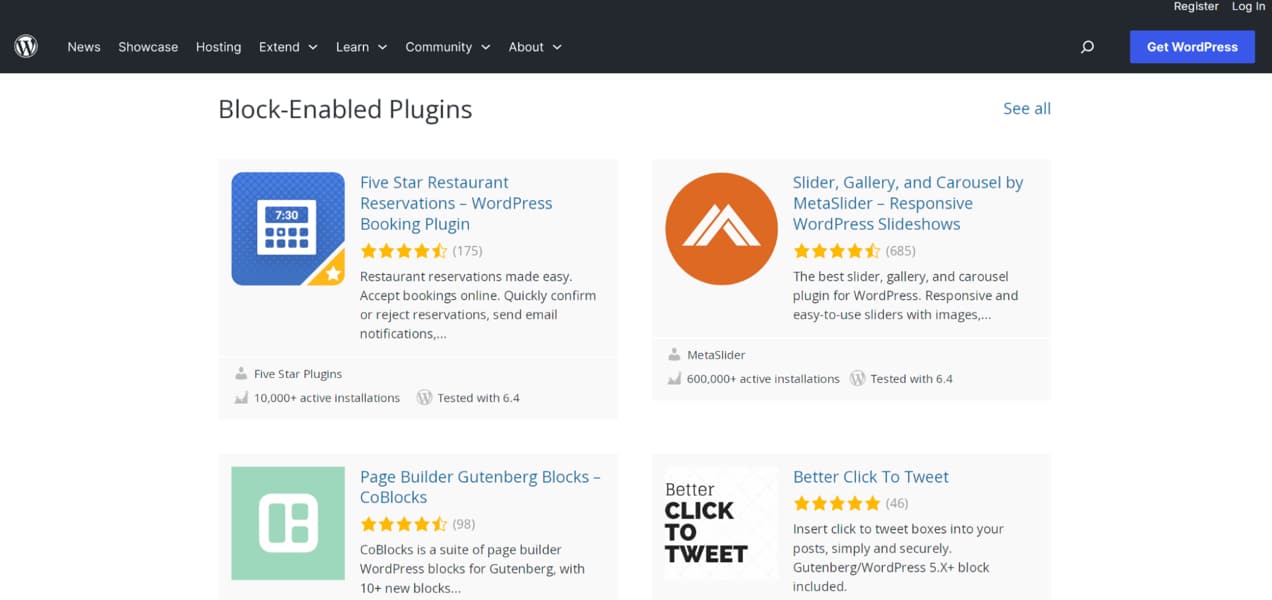
What can you build with open source ecommerce software?
With open source ecommerce software, the options are limitless. You can build absolutely any type of store, and even create your own custom ecommerce solutions (or hire a developer to do so). Here are a few types of stores you can build with the best open source ecommerce tools:
- Traditional ecommerce stores
- B2B businesses
- Service-based companies
- Multi vendor marketplaces
- Restaurant ordering systems
- Stores with regulated or restricted items (like CBD or medical equipment)
- Online bookings and reservation systems
- Subscription-based sites
- Membership portals
- Wholesale stores
- Online course websites
- Digital download hubs
- Software licensing businesses
- Nonprofits
You can see a huge list of examples of websites built with open source in the WooCommerce Showcase.

But let’s take a closer look at a few.

The Kind Pen
The Kind Pen sells vaporizers, parts, and accessories and boasts more than 1,000,000 satisfied buyers. Using open source ecommerce tool, WooCommerce, they were able to create a custom store for their regulated products.
Their website includes features like a wishlist, map of physical locations, and integrations with a variety of marketing software.

Northwest Eye Design
Northwest Eye Design is an ocularist office that specializes in high-quality, custom ocular prosthetics. They also sell accessories on their website, such as eye patches and cleaning products.
They use WooCommerce to sell not just one-time items, but also offer subscriptions for products that customers need to order frequently.

MegaFit Meals
MegaFit Meals sells prepared meals for people working on achieving specific nutrition goals. With open source ecommerce platform, WooCommerce, they offer signature meals that list macros and nutrition facts at a glance.
They also have a custom meal section of their online business. Shoppers can choose their proteins, carbohydrates, and vegetables to create a box of custom meals for their specific needs.

DVO Suspension
DVO Suspension sells specialty mountain bike suspension parts, specifically choosing an open source ecommerce platform to do so.
Their store features filters that help shoppers narrow down to the exact product they need. They also have a product finder tool and even a custom shock suspension option.
Enjoy ultimate freedom and flexibility with open source
Open source is the ultimate gateway to freedom and flexibility for online stores. Without the restrictions and limitations posed by proprietary platforms and licenses, you can truly create anything that you can imagine.
And when it comes to free ecommerce platforms that are open source, WooCommerce truly stands out. It was created so that anyone can sell online, regardless of technical expertise. Plus, it offers powerful functionality and is backed by a developer community passionate about open source.
Ready to open your digital storefront? Get started with WooCommerce.
Frequently asked questions about open source ecommerce
Do you still have questions about open source ecommerce? Let’s answer a few common ones.
Why is open source important?
Open source software is incredibly important in the tech space. First of all, source code that’s available for all to modify creates a great environment for innovation and creativity. You often end up with some of the most revolutionary ideas under these conditions.

Allowing anyone to examine and work on the code also means great transparency and security. The more people working on it, the greater the chance of catching bugs and identifying issues.
Finally, open source software allows for equality and opportunity for all. Due to the nature of open source, anyone can use it, regardless of their economic status or any other factor.
Is WooCommerce open source?
Yes, WooCommerce is an open source ecommerce platform, along with WordPress, the CMS it was built upon. In fact, this has been an integral facet of WordPress since its founding. It goes beyond just software development and has truly turned into an incredible, innovative community designed to make website creation accessible to all.
Who can contribute to open source software?
Everyone can contribute to open source software! Because the code is available for anyone to view and modify as they see fit, anyone can contribute their ideas, skills, experience, and talent.
Contributors don’t need web development expertise, either. For WordPress Contributor Day, for example, there are a variety of areas that volunteers can work on, including:
- Core code
- Design
- Translations
- Accessibility
- Community
- Documentation
- Marketing
- Testing
- Photography

If there’s something you want to contribute, you can find a way to do so.
Is open source software secure?
Open source software can be very secure. Because there are so many people contributing to the source code, it’s easier and faster to find vulnerabilities and solve any potential security problems.
That being said, any and all software can be hacked, whether it’s proprietary or open source. And, in the case of open source, more security tasks can fall into the hands of the individual website owner. That’s why it’s important to follow basic security steps to protect your content and data.
Do open source ecommerce tools require more technical knowledge?
This, of course, can vary dramatically based on the specific tool that you’re using. With open source tools, more power is put in the hands of users. While this allows for ultimate freedom and flexibility, and comes with a wealth of additional benefits, it can also mean a greater learning curve.
However, tools like WooCommerce and WordPress are designed for anyone to use, regardless of their level of technical expertise. With extensive documentation, a vast, global community, and powerful tools like the block editor, even the newest user can create a beautiful, effective online business.
What is a SaaS ecommerce platform?
SaaS stands for software as a service, and is a method of delivering programs to end users online. Rather than purchasing and installing the software, users log in on a compatible device to use the tools. They also subscribe to the software, making this model like renting an apartment, with open source software similar to owning a house.
SaaS ecommerce platforms are not open source. They often include online store functionality, alongside hosting and tech support all in one. However, the software is hosted on their own proprietary platform and the source code is typically not available to modify. In many cases, the terms “software as a service”, “proprietary”, and “closed source” are used interchangeably.
Examples of SaaS platform solutions include Shopify and Wix.
What are some examples of open source ecommerce platforms?
WooCommerce is the most popular and best open source ecommerce platform thanks to its incredible community, limitless flexibility, and powerful functionality. It’s a completely free platform that is built upon the foundation of WordPress, which is also open source.
Other open source ecommerce platforms include Adobe Commerce (formerly Magento Open Source / Magento Community Edition), Drupal Commerce, and Joomla.
What are some examples of other open source software?
The impact of open source software goes beyond ecommerce, with examples like:
- WordPress: The most popular content management system (CMS)
- Mozilla Firefox: A free web browser
- PHP: Hypertext Preprocessor, a coding language
- MYSQL: A popular type of database that powers applications like WordPress, Netflix, and Facebook
- Linux: An operating system comparable to Windows and iOS
- FileZilla: A file transfer protocol (FTP) tool
- Audacity: An audio editor and recorder
- Android: A mobile operating system
How can I contribute to WordPress and WooCommerce?
There are lots of ways that you can contribute to WordPress and WooCommerce!
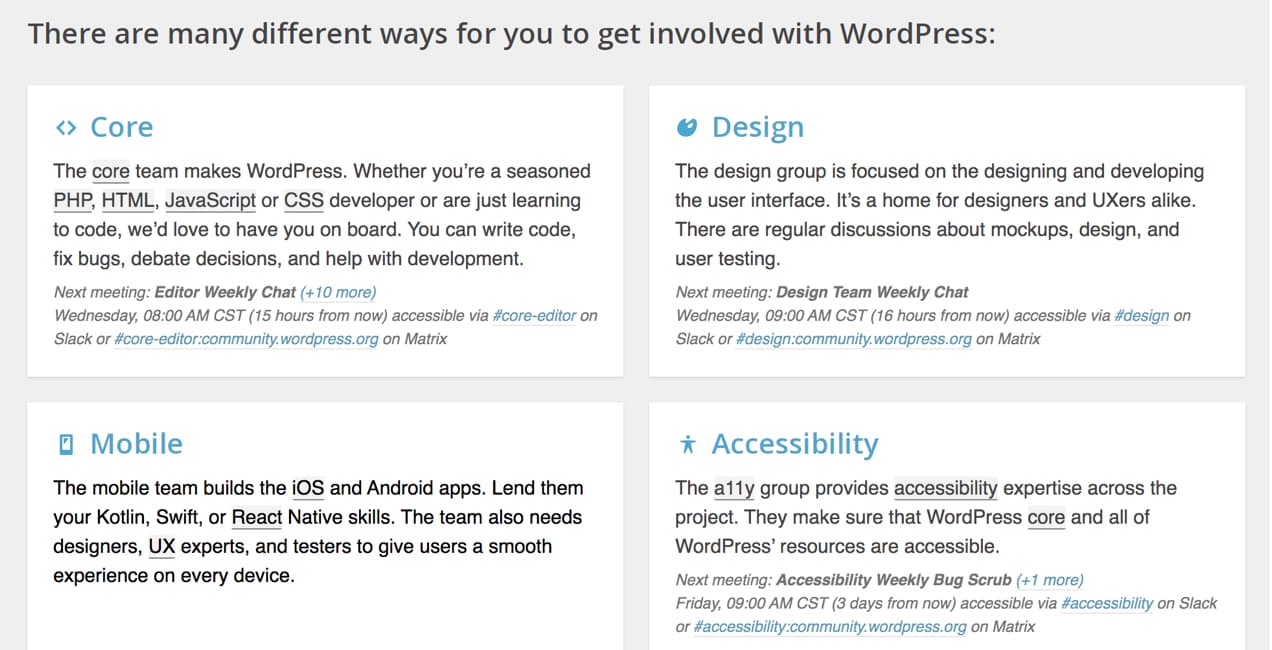
Here are just a few:
- Help develop WordPress core
- Answer a question in the support forums
- Join the WordPress design team
- Work on the accessibility of the software
- Help translate WordPress into a language you’re fluent in
- Build out software documentation
- Review and approve themes or plugins for admission into the WordPress repository
- Create training videos
- Submit a WooCommerce feature request
- Participate in customer research
- Test beta versions of WooCommerce
- Report security vulnerabilities
- Work on WordPress marketing
- Contribute to Five for the Future
- Attend a Contributor Day
As you can see, there are a variety of ways to contribute, no matter your skill set or experience level with WordPress and WooCommerce. An added bonus? You’ll get to meet some incredible people who are passionate about creating an open web.
Can I migrate from a proprietary ecommerce tool to an open source one?
Yes, you can certainly migrate from a proprietary ecommerce tool to an open source solution. However, due to the nature of closed source tools, you won’t be able to move all aspects of your current site.
For example, you can typically move data and information like page content, order history, and product information. However, you usually can’t move the actual design and layout of your website.
Here are some guides to migrating to WooCommerce from proprietary platforms:
These will walk you through all the migration considerations and provide several methods based on your experience level.
Enterprise Ecommerce
Manage and grow your high-volume store with Woo Enterprise — our dedicated enterprise ecommerce service. Get in touch with our team to learn how we can support your unique needs.
"*" indicates required fields